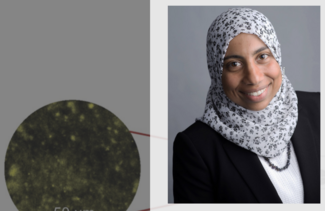
Magnetic elastomers enabling haptic displays
Zoom webinar; Register to receive the Zoom link.
About the Lecture
Magnetism is often overlooked except to show that “opposites attract.” Yet, compared to electric fields, magnetic fields are often capable of greater manipulation of objects both large and small, near and far, visible and invisible.
This talk will focus on the development of haptic (tactile) displays using magnetism. First, El-Ghazaly will consider what is needed to make a reconfigurable haptic interface, one that gives the user the sensation that they are feeling what they are seeing on a visual display. True 3D fidelity in a tactile display requires extremely flexible materials that can also be programmed real-time to physically illustrate what is visually displayed on the screen. Here, she will present how their magnetic elastomer composites can be used to achieve such fidelity.
The research involves two key approaches for developing and enhancing magnetic elastomers for tactile manipulation. The first is the development of ultraflexible, thin-film magnetic elastomer materials formed using nanoscale magnetic particles. The second is the synthesis of very high remanent moment magnetic nanoparticles for inclusion in the elastomer material. With the goal of integrating haptic displays with widespread touch screen technology, this project illustrates the potential impact of magnetism on providing versatility to these ubiquitous systems and ameliorating user interactions with such technologies in the future.
About Amal El-Ghazaly
Amal El-Ghazaly is an assistant professor in the department of electrical and computer engineering at Cornell University. Her work combines magnetism, ferroelectricity, and optics to create tunable, versatile electronic systems for telecommunications, sensing, and actuation.
Prior to joining Cornell in 2019, she was a postdoctoral research fellow at the University of California Berkeley, where she was awarded the University of California President's Postdoctoral Fellowship in 2017. Her postdoctoral research explored new possibilities for ultrafast all-electrical switching of magnetic nanodots for faster and more energy-efficient computer memories.
El-Ghazaly earned a Ph.D. in electrical engineering from Stanford University, where she was funded by both NSF and NDSEG graduate research fellowships as well as the Stanford DARE fellowship until her graduation in 2016. Her Ph.D. research focused on radio frequency devices using magnetic and magnetoelectric thin-film composites for tunable wireless communications. She received her B.S. and M.S. degrees in electrical and computer engineering from Carnegie Mellon University in 2011.